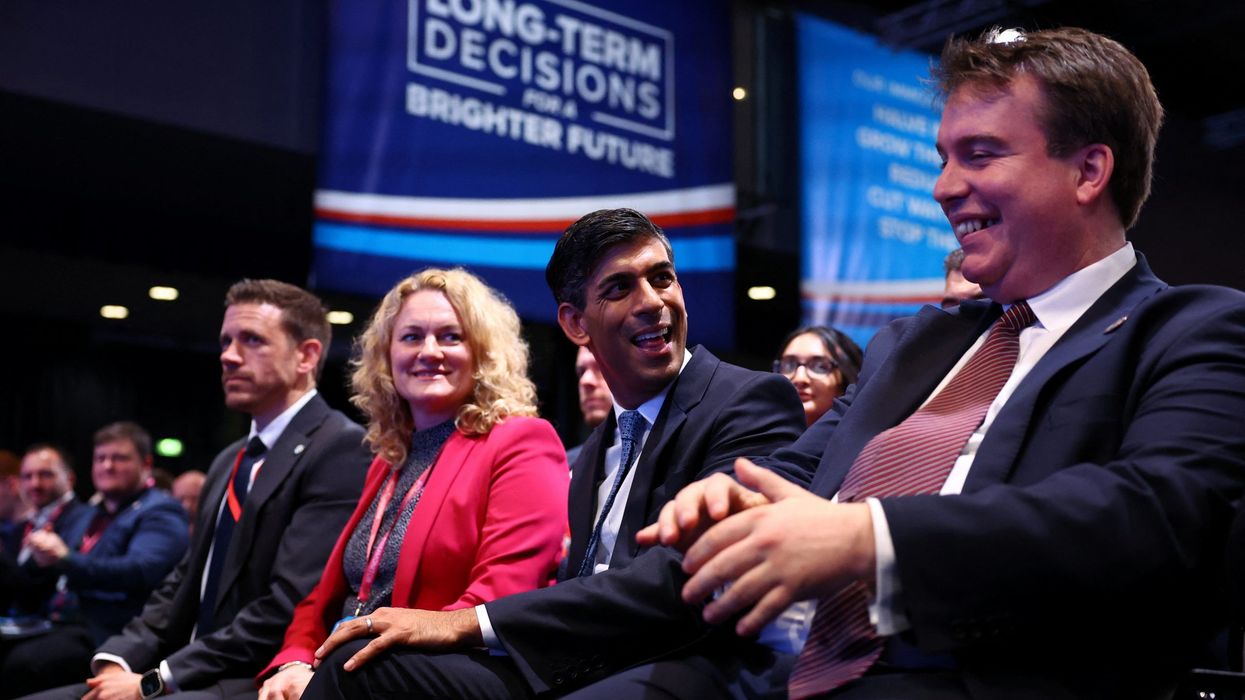BRITAIN's ruling Tories are gathered for their annual conference, with splits surfacing and leadership hopefuls jockeying -- just as the party needs unity heading into a general election as underdogs.
The Tories, in power since 2010, kicked off four days of main stage speeches, fringe events and political networking on Sunday (1), following more than a year trailing the Labour opposition badly in the polls.
Despite signs the gap could be narrowing, many in and outside the party see the next election as already lost and the contest to succeed prime minister Rishi Sunak as party leader already under way.
Meanwhile, fractures over policy -- particularly taxation levels, but also how aggressively to pursue the net-zero agenda -- are increasingly apparent within its ranks, from the cabinet down.
This leaves Sunak, who took charge nearly a year ago after the implosion of Liz Truss's short-lived premiership, struggling to present a united front as he tries to reduce the polling deficit.
"These divides don't seem as deep or raw as the Brexit era, but the Tories have lost all message discipline," said David Jeffrey, a British politics lecturer at the University of Liverpool.
That poses challenges for Sunak in crafting a manifesto "that MPs will want to unite around", he added.
"It seems to me a lot of these divisions are not actually an attempt to influence policy but rather used to position the speaker for the post-election leadership contest.
"To that end, it is not what is being said that is interesting, but who is saying it."
Home secretary Suella Braverman's speech in the US last week, in which she claimed multiculturalism had failed and criticised the international asylum system, was widely viewed as an attempt to burnish her leadership credentials.
Business and trade Secretary Kemi Badenoch, who alongside Braverman ran to replace ex-prime minister Boris Johnson after he resigned in June 2022, is also still thought to harbour ambitions for the top job.
Former home secretary Priti Patel refused to rule herself out of a future party leader bid Sunday, while several current ministers are considered likely to stand if the chance arises.
Meanwhile, Tory big-names not likely vying for the leadership are even less shy in voicing their opinions on policy -- even if they contradict the government's stance.
Speaking Monday (2) at a "Great British Growth Rally" on the fringes of the conference, Truss, who remains an MP, implored finance minister Jeremy Hunt to lower taxes and slash spending when he unveils a mini-budget in November.
"I'm calling upon the chancellor (of the exchequer) at the autumn statement to put corporation tax back down to 19 percent," she said.
"We need to acknowledge that government is too big, taxes are too high and we are spending too much."
Her speech follows senior minister Michael Gove backing pre-election tax cuts in a live television interview Sunday, and dozens of Tory MPs unveiling a pledge Friday not to vote for Hunt's mini-budget if it contains any rates increases.
Sunak, who lost to Truss in last year's party leadership contest but then replaced her unopposed less than two months later, insisted Sunday that lowering decades-high inflation was "the best tax cut" he could deliver.
In recent weeks he has also sought to move beyond the short-term policies that have defined his first year in power to outline a longer-term vision, alongside several more populist policies and pivots.
They include plans to "support drivers" and push back on supposed "anti-car measures" introduced by local authorities, as well as softening green policies aimed at achieving net-zero carbon emissions by 2050.
The strategy shift has coincided with at least two recent polls showing Labour's lead shrinking from the more than 20-point margins seen earlier this year.
One former cabinet minister said that party insiders were increasingly optimistic about Sunak's chances in the election, which must be held by January 2025 at the latest.
He downplayed the current divisions, depicting arguments around tax and other policy areas as healthy internal debate.
(AFP)





